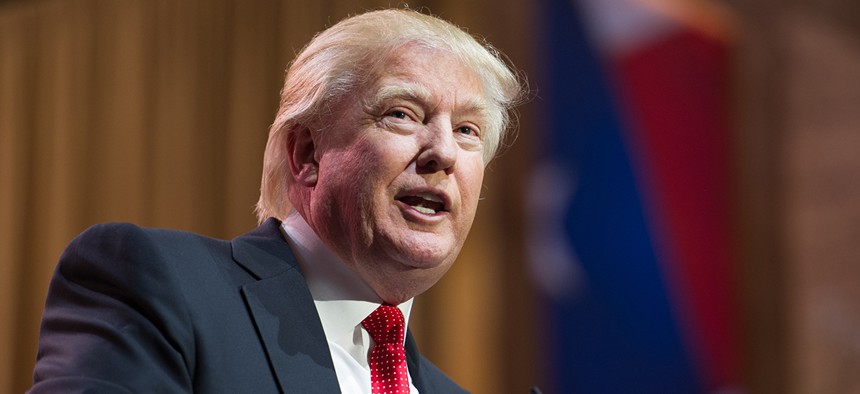
Christopher Halloran / Shutterstock.com
Supreme Court: Constitution Protects Birthright Citizenship
In a case with a lot of similarities to today’s immigration debate, the high court said the children of undocumented immigrants are still U.S. citizens.
If a Republican president actually wanted to end birthright citizenship in the U.S., he'd be up against a 117-year-old Supreme Court ruling that essentially called the issue a constitutional no-brainer.
Donald Trump, Scott Walker, and Bobby Jindal have all said that the children of undocumented immigrants should not automatically become U.S. citizens just because they're born in the U.S.
"I don't think that they have American citizenship," Trump said in an interview Tuesday with Bill O'Reilly. "And if you speak to some very, very good lawyers—and I know some would disagree, but many of them agree with me—you're going to find they do not have American citizenship. We have to start a process where we take back our country. Our country is going to hell."
This isn't the first time a big wave of immigration has prompted politicians to call for an end to birthright citizenship. But doing so would likely require a constitutional amendment—because the Supreme Court said more than 100 years ago that centuries of precedent, combined with the plain text of the 14th Amendment, lead "irresistibly" to the conclusion that the Constitution grants automatic citizenship to children born here, even if their parents aren't citizens.
The circumstances in that case have a lot in common with the current debate: While the controversy today is over undocumented Hispanic immigrants, in the late 1800s the country was trying to crack down on Chinese immigrants. The plaintiff in the case, Wong Kim Ark, was born in San Francisco, to Chinese immigrants who were not U.S. citizens.
Congress had passed a law that prohibited Chinese workers from entering the U.S. and from becoming naturalized citizens. Attempting to enforce that law, customs officials barred Wong from reentering the U.S. after a trip to China. He was, after all, a worker, and it would be impossible for him to be a naturalized citizen. But he claimed to be a U.S. citizen because he had been born, and lived for more than 20 years, in San Francisco.
The Supreme Court sided with Wong. The 14th Amendment to the Constitution clearly grants citizenship to almost everyone born inside the U.S., the Court said in a 6-2 decision.
"Every person born in the United States, and subject to the jurisdiction thereof, becomes at once a citizen of the United States, and needs no naturalization," Justice Horace Gray wrote for the Court's majority.
The 14th Amendment provides that "all persons born or naturalized in the United States, and subject to the jurisdiction thereof, are citizens of the United States and of the State wherein they reside." The amendment was part of Congress' attempt to overturn the Supreme Court's notorious Dred Scott ruling, which said African-Americans could not become U.S. citizens.
But Congress wrote the provision broadly enough to apply to all children born in the U.S., the Court held.
"The amendment, in clear words and in manifest intent, includes the children born within the territory of the United States of all other persons, of whatever race or color, domiciled within the United States," the Court said.
In addition to the text of the 14th Amendment, the Court's analysis reached back to the laws of colonial Europe, calling birthright citizenship an "ancient and fundamental rule." Together, those factors "irresistibly lead us" to conclude that children born in the U.S. are U.S. citizens, the high court ruled.
"To hold that the fourteenth amendment of the constitution excludes from citizenship the children born in the United States of citizens or subjects of other countries, would be to deny citizenship to thousands of persons of English, Scotch, Irish, German, or other European parentage, who have always been considered and treated as citizens of the United States," Gray wrote.
The two dissenting justices argued that such a broad interpretation of the 14th Amendment would open the door too far.
The justices warned of a system in which "children of foreigners, happening to be born to them while passing through the country, whether of royal parentage or not, or whether of the Mongolian, Malay, or other race, were eligible to the presidency, while children of our citizens, born abroad, were not."
(Image via Christopher Halloran / Shutterstock.com )
NEXT STORY: Travelers Can Write Yelp Reviews For the TSA






